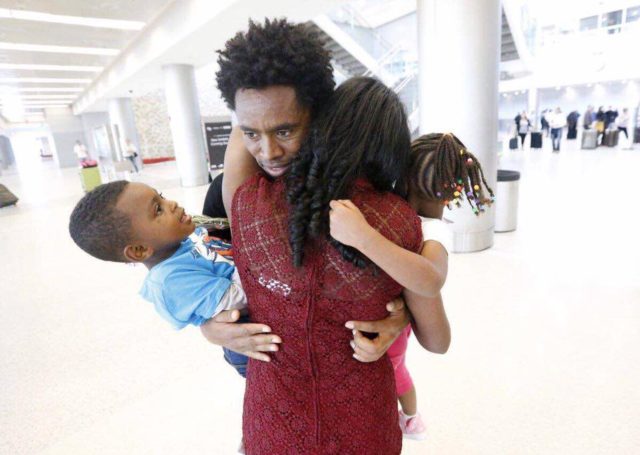The family of Ethiopian runner and Rio Olympic silver medalist in marathon, Feyisa Lilesa, arrived in the United States today, Lilesa told SB Nation.
The family is seeking to resettle in America but had been fearful for weeks to travel due to President Donald Trump’s January executive order on travel. The travel ban developed murky language around refugee and immigrant entrance into the country.
Before boarding their plane to Miami on Tuesday, his family said they “feel good at this point” because of a recent string of court rulings striking down the travel ban.
“I do want to see my family. It has been a while. I do have some concerns,” Lilesa said, explaining how he hasn’t been in the loop about every single detail of the orders because of his marathon training. “I don’t want them to give me or my family special treatment. I’m sure they have reasons why they are putting this ban in place. But, I’m hoping nothing happens to them and we are reunited.”
Tens of thousands of people in Ethiopia were detained by security forces during 2016, according to the Human Rights Watch. Lilesa’s “X” symbol is seen as a sign of solidarity with the Oromo people of the country who have protested the reallocation of their land. Lilesa’s Olympic protest turned him into a folk-hero overnight.
He usually speaks with his family (his wife, Iftu Mulisa, his five-year old daughter, Soko Feyisa Lilesa, and three-year old son, Sora Feyisa Lilesa) in the mornings. Following his summer protest, he told SB Nation upon arriving in the U.S. that he knew “they could get killed” because of his international resistance.
“I do think (Trump) is targeting a certain group of people due to their belief system. That is wrong,” he said, before explaining his perceived disadvantage here in the U.S.
“The day I left my country is the day I gave up my rights,” he said. “This is not my country. Donald Trump was elected through a process and he’s ultimately here to decide what he wants to do about his country and he is in charge. But, I do think it’s unfair to separate people based on their religion and it’s good to understand that people come to this country, refugees and immigrants, because they have problems like I did in my own country.”
Mohammad Ademo, a translator for Lilesa, said the lack of clarity and confusion about Trump’s travel ban and the “proposed suspension of entry of all immigrants and refugees into the U.S.” kept Lilesa’s family in limbo before arriving.
He did say, however, they were properly vetted before leaving Ethiopia with the consular staff at the U.S. embassy in Addis Ababa, Ethiopia.
“They were really hoping for the best and don’t know what to expect,” Ademo said.
Lilesa and the family will enjoy a small vacation for Valentine’s Day in Miami, where he welcomed them. Saturday, Lilesa and his family will travel from Miami to Los Angeles then to Phoenix then to Flagstaff, Arizona, where he lives and trains, provided there aren’t any issues.
After finding his family at Miami International Airport, to their happiness at clearing immigration, Lilesa thanked God (Waaqa) for reuniting him with the trio. He thanked his family for their patience during his exile from Ethiopia. But he did admit, he had mixed emotions.
“Despite my physical safety here in the U.S. and now a family reunion, the Ethiopian government’s ongoing abuse of the Oromo people gives me no rest,” he said in a statement from Miami.
“I want to make sure that we don’t forget the plight of millions of Oromo and other Ethiopians who are still being killed, beaten, imprisoned, dispossessed and kept in poverty,” he continued. “I will continue to speak out against injustice and its perpetrators. My biggest wish is to see the freedom of my people — all people, in every country.”
























